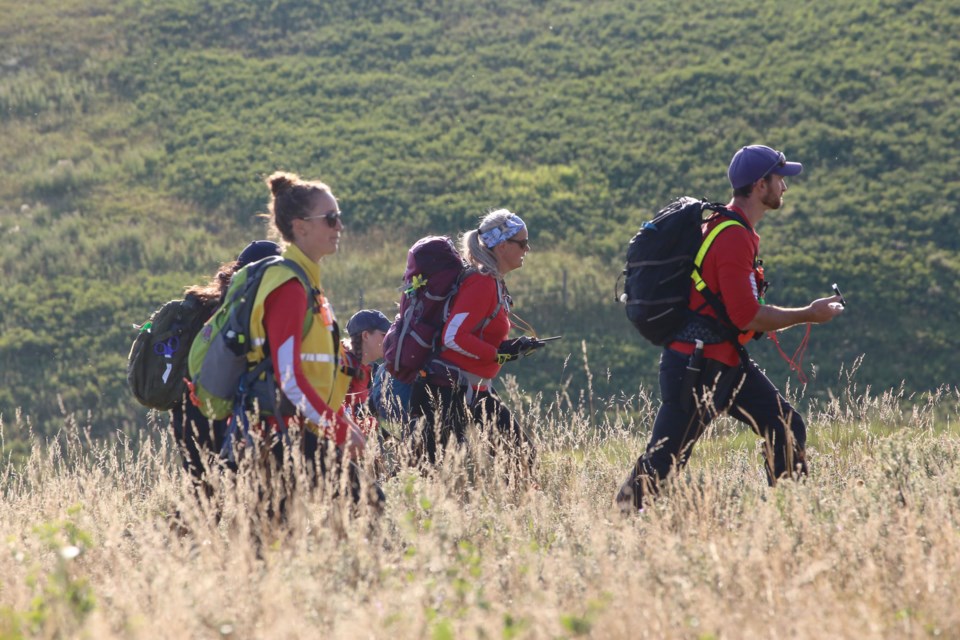COCHRANE— A pair of rescues over the weekend are two in a long list of responses that Cochrane Search and Rescue has been involved in during this record-breaking year.
“It’s been Cochrane’s busiest year to date,” said Cochrane Search and Rescue president Stefan Lund. “That was our 35th incident of the year, which is a record year in the history of the organization.”
The previous record was 26 incidents in a calendar year.
On Saturday (Nov. 28) night, the first of this weekend’s calls came in when Cochrane Search and Rescue was called to respond to reports of a missing person at roughly 10 p.m.
The subject of the search, a 70-year-old Cochrane resident named Jim Beatty, went missing after he left his home for a walk on Saturday afternoon.
When he failed to return for dinner, his family notified RCMP, who then called in Cochrane Search and Rescue.
The search for the man proceeded well into the night, Lund said.
“At that point we had members reflex tasking on the ground, coving the high probability areas in town. That went on until about five in the morning on Sunday, at which point we engaged a second operational team of members to come in and pick up with the support of Calgary Search and Rescue and Foothills Search and Rescue as well."
The second group of members commenced their search at around 7 a.m. They persisted in their search until Sunday evening, when the missing person was located, alive and well.
Lund noted that some of the details involved in this particular case prevented him from providing details on how and where Beatty was eventually located.
When a person is reported lost in an urban setting, specific steps are taken by Cochrane Search and Rescue to streamline its search efforts.
“When the weather is inclement like it was on Saturday night, starting to get quite cold, and knowing that the person was on a walk, we typically use lost person behaviour," he said. "It’s a science, basically, of studying characteristics of lost people who go missing, and what the best tactics are to find them."
In a search like this, rescuers engage in what is known as a Type One Hasty Search, Lund said, which is a fast-paced search conducted by small teams who clear high probability areas by routes of least resistance.
In a setting like Cochrane, the high probability areas are the pathways connecting neighbourhoods and along the river.
“Getting teams out quickly to cover the high probability areas first in a short period of time after a person goes missing is the most critical,” Lund said. “That allows us to guide where the search proceeds after that.”
He noted the public aide in this case was particularly valuable.
After the initial call came in Cochrane Search and Rescue made a post to its Facebook page, asking residents to check sheds and sheltered places on their property.
That post was shared more than 3,300 times and reached more than 190,000 individual users.
“It was a huge undertaking, and one of the unsung resources in Cochrane was the community. The ability for dozens and dozens of people on Facebook to share the information and check their backyards and sheds as we asked them to do to help support our search efforts is huge,” Lund said. “Especially when people go missing and its cold, if they’re not in the right frame of mind they can seek refuge in some of those places and that helps us clear tons of area very quickly.”
Sometimes when volunteers show up for searches, it can actually be a determent to search efforts. Volunteers take extra resources to manage and don’t have the level of training that members of Cochrane Search and Rescue have.
The countless hours invested in training members go through allows the leadership of Cochrane Search and Rescue to feel confident when members report that an area is clear during a search.
The way in which the community responded in this case, Lund said, was very helpful to the search teams.
“For things like this, when someone goes missing in the community, it’s just as helpful to have the community doing its part in sharing and keeping an eye out," he said. "While we didn’t specifically ask for community volunteers, because sometimes community volunteers can be a handful to manage with the amount of people that show up, the volunteering that they did to spend the time to check their properties and keep their eye out is just as important for us."
After nearly 24 hours of searching, the search was resolved, but the night was just beginning for Cochrane Search and Rescue.
“As we were wrapping up the first incident— We had just found out that the gentleman had been located— We were called by the RCMP for a search for another missing person in Canmore,” Lund said. “We actually took the resources that we were deploying in Cochrane, packed them all up, and headed straight to Canmore.”
The second search was a similar circumstance. A senior citizen with dementia had gone for a walk in the afternoon and had not returned home when he was expected.
Lund said the second search commenced Sunday (Nov. 29) evening and lasted until roughly 2 a.m. when the man returned home on his own.
The outcomes of both searches over the weekend were positive, which was a result of the confidence Lund has in his team and their ability to execute their searches in a comprehensive way.
“Whenever we have the ability to have someone found alive, that’s truly the most important part of the search,” he said. “That’s sort of the biggest thing, is having the confidence in your team to know that they’ve cleared an area effectively. To know that the person isn’t there is just as valuable for our team as we continue to search.”




